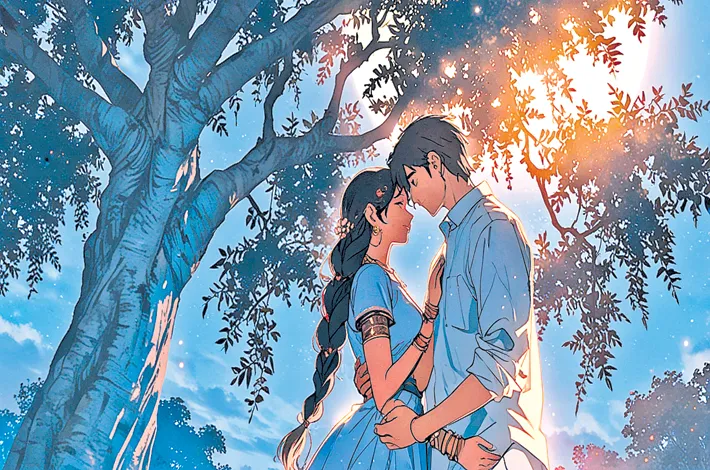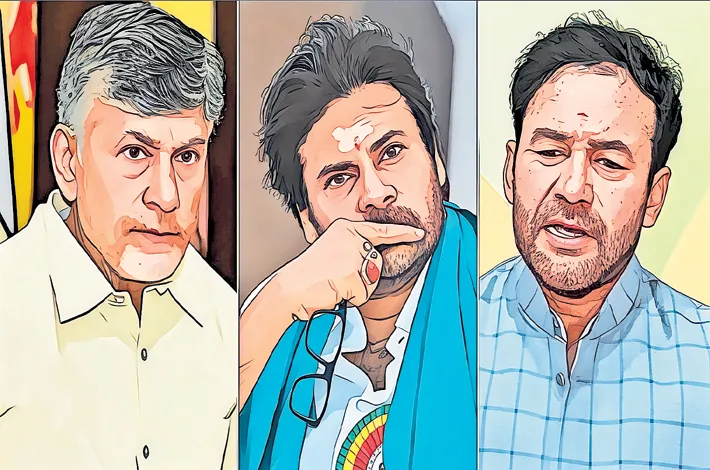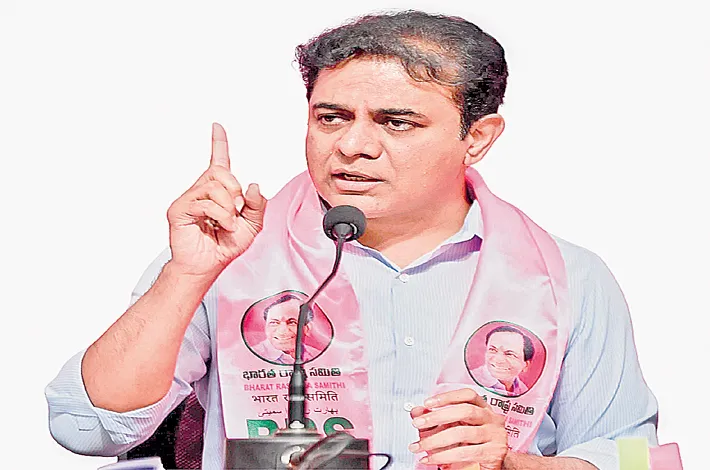Of moonlit promises, and more!
25-07-2025 12:00:00 AM

Under the sprawling banyan tree in the village of Chandrapuram, where the moonlight danced on the leaves, Kanchana’s heart raced. She was the spirited daughter of Buchabbai, a wealthy landlord whose estate stretched across the lush fields of Andhra. Kanchana, with her sharp wit and radiant smile, had always been the apple of her father’s eye, but her heart belonged to someone else—Srinivasa Rao, or Vasu, as she called him. They had met during her studies in the city, where Vasu’s charm and earnest eyes had captivated her. He was the son of Subbarayudu, another prominent figure, and their budding romance was the stuff of dreams, filled with stolen glances and secret letters.
But love, as Kanchana learned, was never simple in Chandrapuram. Her father, Buchabbai, was a man of tradition, his wealth matched only by his pride. When Kanchana returned home, she carried her love for Vasu like a hidden treasure, unsure how to reveal it. Her younger sister, Ratnamala, was her confidante, though Ratna’s own heart was tangled in its own story. Ratna, fiery and impulsive, had recently clashed with Ranga Rao, the assistant manager of their estate. Their argument had been fierce—Ratna’s sharp tongue had led to Ranga’s dismissal, and in retaliation, he staged a dramatic strike outside their mansion, much to Buchabbai’s chagrin.
One evening, as the village settled under a velvet sky, Kanchana slipped out to meet Vasu by the riverbank. The air was thick with the scent of jasmine, and the song “Vennela Reyi” played softly in her mind, its melody a gift from Master Venu’s genius. Vasu stood waiting, his silhouette framed by the moon’s glow. “Kanchana,” he whispered, taking her hand, “I can’t imagine a life without you. But your father… he’ll never agree.”
Kanchana’s eyes shimmered with determination. “We’ll find a way, Vasu. Love like ours doesn’t fade under pressure.” Their hands intertwined, they spoke of dreams—of a life where they could walk openly together, free from the weight of family expectations. But their moment was cut short by the sound of footsteps. It was Ratna, breathless and wide-eyed. “Kanchana, you need to come home. Father’s furious about Ranga’s strike, and he’s talking about marrying you off to some city businessman!”
Panic gripped Kanchana, but she squeezed Vasu’s hand. “Meet me tomorrow at the old temple,” she said. “We’ll figure this out.” Vasu nodded, his resolve mirroring hers.
Back at the mansion, chaos reigned. Buchabbai paced the veranda, his voice booming as he scolded Ratna for her role in Ranga’s dismissal. “That boy’s causing a scene, and you’re to blame!” he roared. Ratna, however, was distracted, her thoughts lingering on Ranga. She had seen something in his eyes during their fight—a spark of defiance that matched her own. Against her better judgment, she found herself drawn to him.
The next day, as Kanchana slipped away to the temple, Ratna decided to confront Ranga. She found him sitting stubbornly outside the gate, his makeshift protest sign leaning against a tree. “You’re making a fool of yourself,” she said, crossing her arms. Ranga smirked, his eyes glinting. “And you’re the one who got me sacked, princess. Care to make it right?”
Their banter crackled with tension, but beneath it, something softened. Ratna saw past Ranga’s bravado to the man who cared deeply for the estate’s workers, who stood up for what he believed in. By the time they parted, Ratna’s heart was a tangle of confusion and curiosity.
At the temple, Kanchana and Vasu devised a plan. They would appeal to Subbarayudu, Vasu’s father, to mediate with Buchabbai. But their meeting was interrupted by Varahala Raju, Buchabbai’s son, who dreamed of directing films and saw their romance as the perfect script. “This is better than any movie!” he exclaimed, promising to help. Varahala, with his infectious enthusiasm, roped in Meenakshi, the manager’s daughter, to stage a dramatic scene to win Buchabbai’s approval.
The plan unfolded at the village festival, where lanterns glowed and music filled the air. Varahala orchestrated a play, casting Kanchana and Vasu as star-crossed lovers. The villagers watched, enthralled, as the story mirrored their own. Buchabbai, seated in the front row, was visibly moved. When Vasu stepped forward, declaring his love for Kanchana in front of the crowd, Buchabbai’s stern facade cracked. Subbarayudu, present at the festival, added his blessing, praising Vasu’s integrity.
Meanwhile, Ratna and Ranga found themselves side by side, watching the play. In a quiet moment, Ranga admitted, “I didn’t strike just for the job. I wanted to see you again.” Ratna blushed, her defenses crumbling. “You’re impossible,” she muttered, but her smile betrayed her.
As the festival ended, Buchabbai called Kanchana and Vasu to his side. “You’ve got courage, boy,” he said to Vasu. “And you, Kanchana, you’ve got your mother’s heart.” With a reluctant nod, he gave his blessing, swayed by the village’s cheers and his own softening heart. Ratna, emboldened, confessed her feelings for Ranga, who was promptly reinstated as manager.
Under the same banyan tree where it all began, Kanchana and Vasu stood hand in hand, the moonlight sealing their promise. Ratna and Ranga joined them, their laughter mingling with the night breeze. Varahala, ever the dreamer, declared, “This is my masterpiece!” as he planned his next film, inspired by their love. In Chandrapuram, where tradition and passion collided, love had triumphed—not just for one couple, but for two, proving that even the stubbornest hearts could bend under the magic of a moonlit night.








